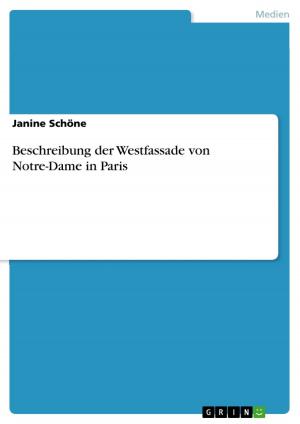International public broadcasting, governments' power in the world and the spheres of influence
A comparison of the German Deutsche Welle and the American Broadcasting Board of Governors along with their history and a reflection on international public broadcasting's importance for nations' roles in the world
| Author: | Julia Harrer | ISBN: | 9783656008026 |
| Publisher: | GRIN Verlag | Publication: | September 15, 2011 |
| Imprint: | GRIN Verlag | Language: | English |
| Author: | Julia Harrer |
| ISBN: | 9783656008026 |
| Publisher: | GRIN Verlag |
| Publication: | September 15, 2011 |
| Imprint: | GRIN Verlag |
| Language: | English |
Seminar paper from the year 2009 in the subject Communications - Mass Media, grade: 1, , course: Media in Global Perspective, language: English, abstract: How is international public broadcasting related to the roles governments play in the world? The Federal Republic of Germany and the United States of America have used international public broadcasting as a means of foreign public diplomacy in the past as well as in the present. The main research question of this paper investigates how the history of international public broadcasting in each country is related to the role these nations play on the globe. Governments used radio and television to inform and emit messages to a large audience ever since its invention. This study explores the history of international public broadcasting in Germany and the U.S. examining characteristic developments. In a second step my research analyzes the role of the two countries on the globe and how the two nations utilize international public broadcasting to realize their roles. Based on textual analysis of secondary sources I argue that a country's history and its involvement in conflicts reflect the importance of international public broadcasting. The U.S. used broadcasting to maintain the spheres of influence in the world whereas the German international public broadcasting service Deutsche Welle served as a tool to distribute content for countries where democracy and the freedom of speech, press and opinion lack. The comparison of the history of the two nations serves as evidence why international public broadcasting is more perceived as very powerful by the U.S. than by the Germans. Whereas the U.S. was involved in major conflicts throughout the last century, Germany did not participate actively in those wars. Meanwhile, the U.S. is perceived as the last superpower in the world and as the world's police. Therefore, the U.S. has a powerful role in the world maintaining the spheres of influence by using international public broadcasting. In that sense, radio and television are used as a cultural means to impose the U.S.-American lifestyle and ideas on other peoples via airwaves.
Seminar paper from the year 2009 in the subject Communications - Mass Media, grade: 1, , course: Media in Global Perspective, language: English, abstract: How is international public broadcasting related to the roles governments play in the world? The Federal Republic of Germany and the United States of America have used international public broadcasting as a means of foreign public diplomacy in the past as well as in the present. The main research question of this paper investigates how the history of international public broadcasting in each country is related to the role these nations play on the globe. Governments used radio and television to inform and emit messages to a large audience ever since its invention. This study explores the history of international public broadcasting in Germany and the U.S. examining characteristic developments. In a second step my research analyzes the role of the two countries on the globe and how the two nations utilize international public broadcasting to realize their roles. Based on textual analysis of secondary sources I argue that a country's history and its involvement in conflicts reflect the importance of international public broadcasting. The U.S. used broadcasting to maintain the spheres of influence in the world whereas the German international public broadcasting service Deutsche Welle served as a tool to distribute content for countries where democracy and the freedom of speech, press and opinion lack. The comparison of the history of the two nations serves as evidence why international public broadcasting is more perceived as very powerful by the U.S. than by the Germans. Whereas the U.S. was involved in major conflicts throughout the last century, Germany did not participate actively in those wars. Meanwhile, the U.S. is perceived as the last superpower in the world and as the world's police. Therefore, the U.S. has a powerful role in the world maintaining the spheres of influence by using international public broadcasting. In that sense, radio and television are used as a cultural means to impose the U.S.-American lifestyle and ideas on other peoples via airwaves.















